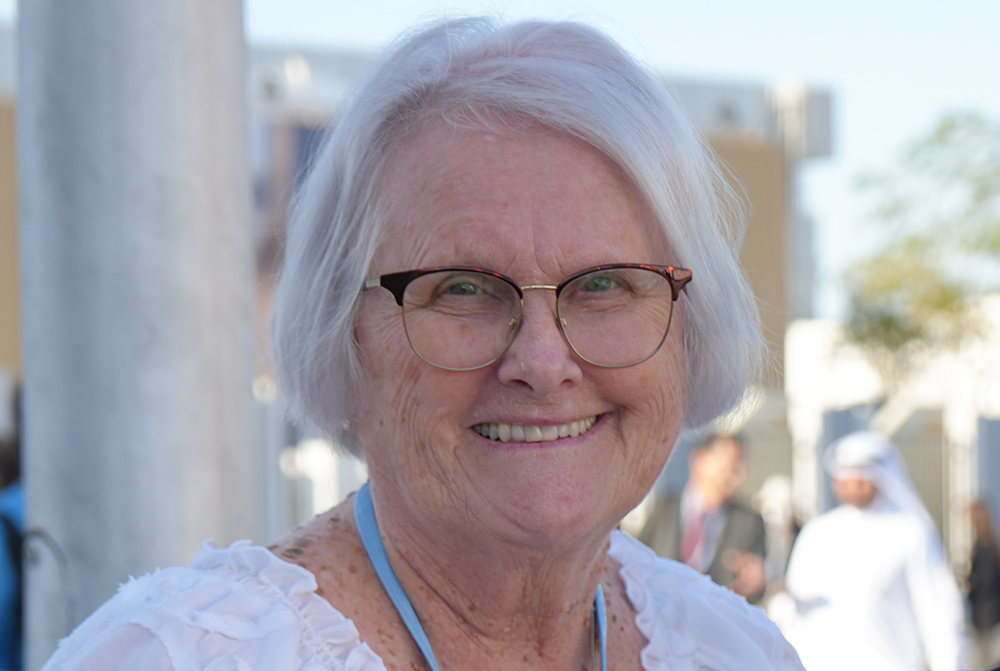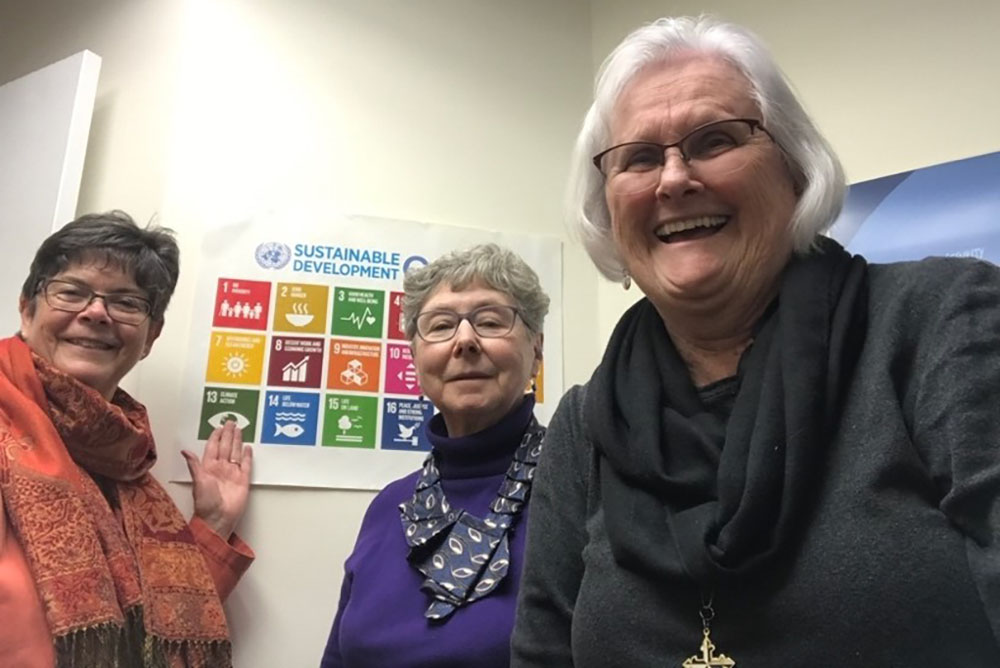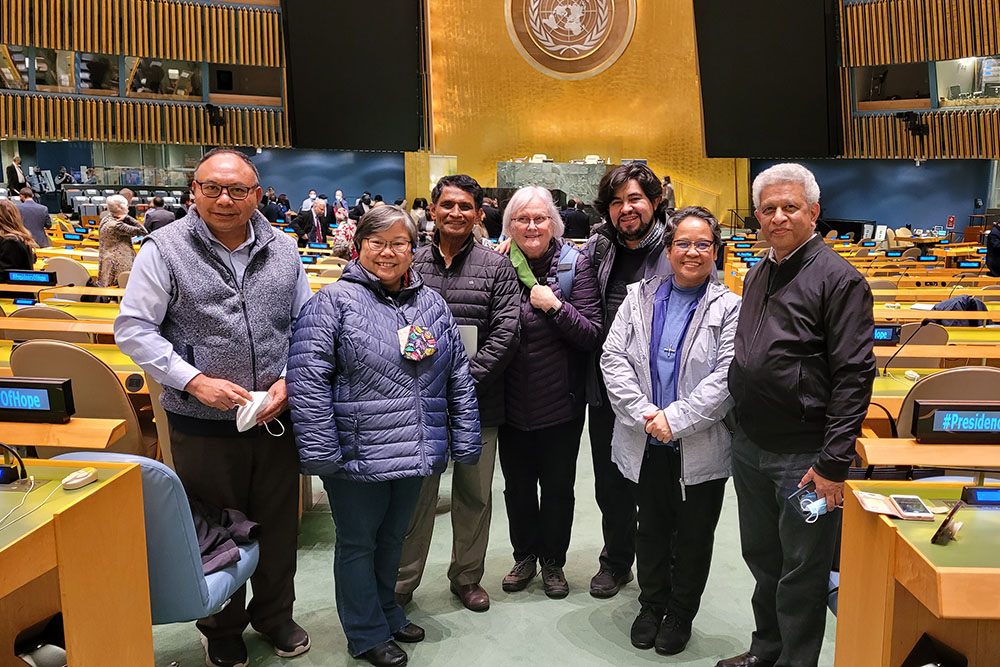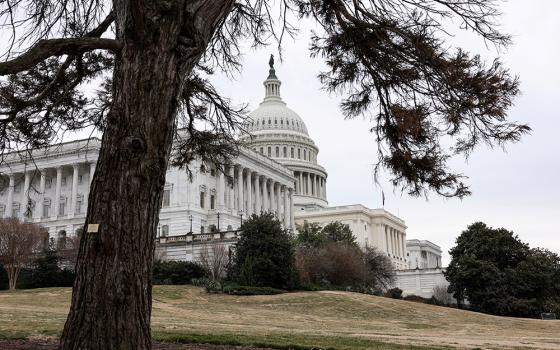
Adrian Dominican Sr. Durstyne Farnan, who has represented the Dominican Leadership Conference at the United Nations since 2019, attends the 2022 U.N. climate change conference in Sharm el-Sheikh, Egypt. (EarthBeat photo/Doreen Ajiambo)
Worldwide, nearly 2.4 billion women of working age do not have the same legal rights as men, according to a 2023 report by Women, Business and the Law, a World Bank Group project. That's an astounding fact, considering women make up just over 50% of the global labor force, produce 80% of food in developing countries, and provide the majority — upward of 75% — of unpaid care to children and adults in their families.
Gender equality is one of the United Nations' 17 sustainable development goals for the planet and its population. The sustainable development goals, ranging from eradicating poverty to protecting the climate, are connected in a way that achieving one goal helps reach another — people with access to nutritious food have a better chance at good health, for instance. But the U.N. Commission on the Status of Women noted that gender equality is at the center of the solution for all the goals.
It's a belief shared by Adrian Dominican Sr. Durstyne "Dusty" Farnan, a representative to the United Nations for the Dominican Leadership Conference since 2019.
Farnan's roles have included stints as a teacher, clinical social worker, vocations director and justice promoter. As a formation minister working with Indigenous sisters in Ghana and Kenya, she saw how few rights are granted to African women. In 2015, as part of a delegation visiting Iraq, she discovered how many Iraqis — often disproportionately women and children — were forced from their homes by war and terrorism.
But Farnan also has faith in the power of women.
"We have to keep educating girls because they are our future, our hope that this world will become more equal and that we will become more life-giving," she said.
GSR: How does gender equality figure into solving the United Nations' sustainable development goals?
Farnan: All of these sustainable development goals are related to decision-making and leadership. So if we look at the goals through the lens of gender equality, we might begin to see other issues we need to address. But you can't talk about women without bringing in women. We need women to talk about how they are affected by these goals. We need women to be involved in decision-making and in leadership.
We need to address how women are affected by poverty, hunger, well-being, education or water. Water is a huge women's equity issue. Do you know how many women walk miles to get a bucket of water to prepare dinner for their families or drink or use in daily life? If women don't have water, guess what? The men don't eat.
Look at war and conflict. If women were at the table, do you think there might be some potential resolution to the conflict in Gaza or Israel or Haiti, for that matter?
How can you look at these goals and not see the central role of women in all of them? Women make up half the population of the world, and women have another way of thinking about conflict, about equality, equity, gender, about sexuality. How often have you had conversations regarding one of these goals, but nobody even brings up the role of women?

From left: Sacred Heart of Jesus Sr. Sheila Smith, St. Joseph Sr. Barbara Bozak and Dominican Sr. Dusty Farnan show a poster of the U.N. sustainable development goals after participating in the 66th Commission on the Status of Women in 2022. (Courtesy of Durstyne Farnan)
It's because we don't make the connection between them, and making the connection is one of the things all of us have to be better at doing. Not only for the sustainable development goals, but for all the issues we're talking about.
Gender inequity in wages is a big problem, especially when women can't earn enough to provide for themselves and their families. Can we help women make strides economically?
Here in New York, you see these young women in and outside of Grand Central Station selling fruit they prepared. They buy the fruit, cut it up, put it in little plastic containers and sell it. This is their informal economy to take care of their families. They do an amazing job, but it's hard work.
And that's just New York City. Can you imagine what it's like in other countries where women are responsible for feeding their families?
We need more microlending and microfinancing programs for women. We have to be sure they have access to capital and the products they need for them to grow economically.
There's no doubt that investing in women this way is extremely important. That's why a lot of religious congregations, particularly in this country, have set up trust funds or grants — in our congregation we call them alternative investments — where women can apply for financial help to become successful in their own economies so they can feed and care for their families.
We have to engage and invite women. They need to be encouraged to create opportunities for themselves — whether that's a sewing or food co-op, making bread or even caretaking, which is also a huge part of women's roles in the world. We need to have what we call a care economy, so women are actually funded for the caregiving of their families, whether that's an elderly parent or children. This is economic justice.

Dominican Sr. Dusty Farnan (center) stands with other nongovernmental organization representatives at the United Nations in New York in November 2021. (Courtesy of Dusty Farnan)
How do we turn men and boys away from the attitude of the patriarchal society and toward gender equality?
We'll leave them on the sidelines and don't let them take over. [Laughs.] We bring them in.
Every mother needs to start off teaching sons and daughters equally. When young boys and girls grow up together, recognizing each other's gifts, understanding that they're equals, then we're going to see some change. That's a very important first step.
So we need to educate even our mothers on how to include their sons as well as their daughters to see from the other's perspective and not just from their own. Gender equality means some kind of shared understanding with one another.
Governments can play a role, too, particularly in the United States, where we have a woman vice president. We now have the first African American woman on the Supreme Court. We should nominate women in other governmental departments, like housing and transportation, for example.
This is what we hope the church is doing, too. That's why we're excited that Pope Francis is starting to nominate women in certain positions in the church — which is another form of government, if you will. Nominating women shows respect to them by inviting them to the table.
Advertisement
There's no doubt patriarchy is still alive and functioning in the church, sadly, and in the world. I think one of the saddest things I've seen is Jeffery Epstein being brought up again in the media. That man did terrible things to women and young girls in terms of human trafficking, and it's astonishing to me how long he was able to do it, and how many people covered it up. And how many women were a part of it, for whatever reason.
I think gender equality means calling women to take up their role as well and not just give in to certain kinds of things. If we see something in social media that is really the objectification of a woman, we need to say something — respond on Facebook or wherever you see it. Don't just let it happen.
In the same way, I think whenever we see something good happening, we need to comment on it. Whenever you see a woman take a position that is a little bit to the left, compliment her because you know she's risking a lot when she makes a statement contrary to the majority.
What other actions can we take to promote the empowerment of women?
We as women need to be more proactive and engaged in gender equality. We need more women to help bring about the empowerment of all women and girls in the world.
So women need to surround their friends who are taking on leadership roles. You can't do this alone. It's like breaking through the glass ceiling, and in order to do that, women need women.
We also need to welcome ideas from each other, not disparage them. The big words today are diversity and inclusion. We have to call on the diversity of ideas as well as the diversity of people and cultures, because if we don't, we're going to miss out on a potential pathway to a peaceful world.






